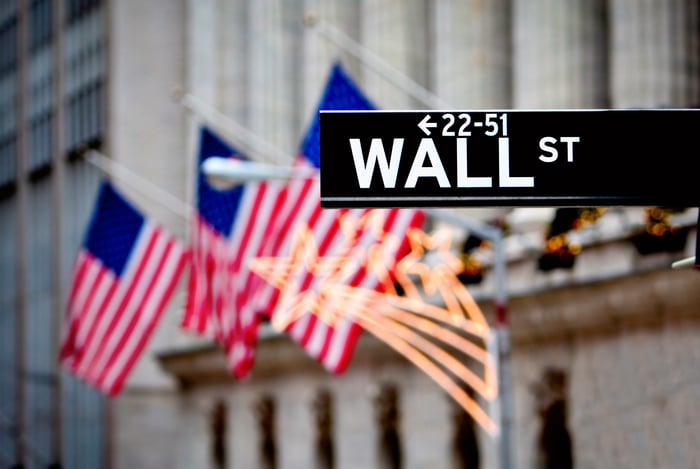It has been a rip-roaring start to 2023 for the stock market with the technology sector performing particularly well. The Nasdaq-100 index, which is home to the largest tech companies listed on the Nasdaq exchange, has surged 42% year-to-date.
But has it moved too far, too fast? While it shouldn't be a concern for long-term investors, there's a chance the market could take a temporary breather based on some data released in the 2023 second-quarter earnings report of Interactive Brokers (IBKR 2.48%), one of the world's largest online stock brokerage firms.
While the company had a record number of customers, it revealed some evidence investors might be more cautious now than they were at the start of the year. Share trading volumes dropped materially both year over year and compared to Q1, as investors are sitting on significant gains in the "Magnificent 7" tech stocks and are reluctant to sell. But it's also an indication that investors are hesitant to open new positions, and here's what IBKR thinks will happen next.

Image source: Getty Images.
Investors have piled into big tech stocks this year
It's no secret to investors that a very narrow group of tech stocks have led the broader market higher this year. The phenomenon is so prevalent that one Bank of America analyst dubbed them the "Magnificent 7," and the group includes:
- Apple
- Microsoft
- Amazon
- Google parent Alphabet
- Meta Platforms
- Tesla
- Nvidia
The top performer of the bunch is Nvidia, which is sitting on a whopping 209% gain for 2023. But even the worst performer, Alphabet, has returned 34% which is much better than the 18% return of the benchmark S&P 500 stock market index.
IBKR had a record-high 2.29 million customer accounts in Q2, climbing 19% year over year. Company director Nancy Stuebe said the Magnificent 7 was the most popular group of stocks among the client base in 2023. But she said that trend is now detrimental to brokerage commissions, because investors are reluctant to sell their positions. It likely means they expect further upside, but on the other hand, investors also aren't rushing to buy more.
IBKR's share trading volume fell 28% year over year, which was by far its worst-performing segment. It was also down 22% compared to the first quarter result just three months prior, which points to an abrupt drop in enthusiasm for new positions. Here's more bad news: Stuebe doesn't expect this situation to reverse any time soon.
But IBKR did catch one major tailwind in Q2
While lower trading volume equals less commission revenue, IBKR has been a major beneficiary of rising interest rates which are more than making up for it. The firm generates interest income in two ways: first, it earns interest on the cash its clients are holding in its custody, and second, it earns interest on money it loans to clients to buy stocks and other financial assets (often called margin lending).
Thanks to the rapid rise in interest rates over the last 12 months, IBKR's overall Q2 net interest margin (NIM) came in at 2.29%, which was almost double its year-ago result. The NIM is the difference between the interest rate IBKR earns, and the rate it pays back to lending partners and clients.
The end result was $1.3 billion in net interest income, an increase of 110% year over year. Because IBKR offers to pay a relatively high interest rate to customers who hold cash in their accounts (to entice them to stay), the majority of its net interest income came from margin lending. Revenue for that segment specifically topped $1 billion, up 195%.
Since commission revenue was flat, IBKR can attribute all of its overall second-quarter revenue growth of 58% to the interest rate environment.
The Magnificent 7 might have a quieter second half of 2023
That shouldn't come as a surprise. It would be unrealistic to expect shares of Nvidia to triple again over the next six months, for example, because that would make it the largest company in the world! IBKR Chairman Thomas Peterffy believes trading will be down somewhat for the rest of the year, but he's optimistic there could be more volume coming from new investing strategies powered by artificial intelligence (AI).
He thinks there could be a spike in registered investment advisors in the future, who rely on AI algorithms to manage their clients' money. This might drive down the cost of advice, which will attract smaller investors in larger numbers. On the whole, that trend would be positive for IBKR's commission revenue.
On the flipside, interest rates probably won't remain at elevated levels for much longer. Experts are already predicting the U.S. Federal Reserve will begin to cut rates early next year, which will slowly erode IBKR's NIM. However, lower rates are typically good for stocks, so it could drive investors into the market and reignite the company's commission revenue.
Therefore, even if the tech sector and the Magnificent 7 experience a more subdued second-half of 2023, they might simply be consolidating ahead of further upside in 2024. As I mentioned at the top, long-term investors probably shouldn't be swayed by this.




